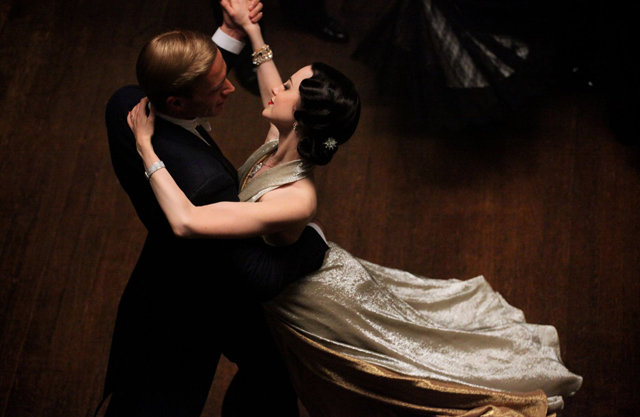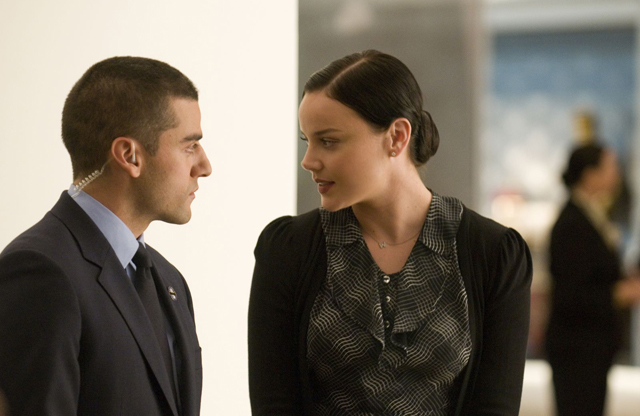CHICAGO – In anticipation of the scariest week of the year, HollywoodChicago.com launches its 2024 Movie Gifts series, which will suggest DVDs and collections for holiday giving.
‘W.E.’ is Decent Directorial Effort From Madonna
 Rating: 3.5/5.0 |
CHICAGO – It’s easy sport to disregard a director when the name attached to that title is Madonna, the famous pop star. “W.E.” is a story about fame in another era, and Madonna’s understanding about fame in general – and its dark underside – actually made her the right choice to handle such a story.
The film is not without its flaws, beginning with some unfortunate shorthand in some of the male characters (Madonna also co-wrote the script), but the choice to tell a story in two eras – one a British royal scandal from the 1930s and the other a dissolving marriage in the 1990s – actually works in strengthening both threads. The film even survives the fantasy of the two opposing-era characters talking to one another. Madonna shows empathy and a dash of her own life in rendering the lives of the real Wallis Simpson and the fictional Wally Winthrop.
Wally (Abbie Cornish) is a upper crust New Yorker married to a famous psychiatrist (Richard Coyle). She is named Wally because her mother was obsessed with the British royal scandal of the 1930s, in which King Edward (James D’Arcy) gave up his throne in exchange to marry a twice-divorced American woman, Wallis Simpson (Andrea Riseborough). The story runs on parallel rails – Wally becomes enamored during an auction of the disgraced couple’s effects in New York City, and while she interacts with these baubles, there is a flashback in context to the unfolding royal scandal back in the 1930s.
 Photo credit: The Weinstein Company |
Wallis Simpson’s history is revealed through her possessions. She survives an abusive first marriage and an indifferent second one, to fall in love with Edward Windsor (the film’s title is their nickname for each other, Wallis/Edward or “WE”). Even as he ascends to the throne their love never wavers, until finally he gives up his country to be with her. Sixty years later, Wally has her own marital issues, including a husband who is prone to disappearing, and even when at home seems resentful. It is a security guard at the auction house named Evgeni (Oscar Isaac), who sees a certain sadness in Wally, and breaks through her wall of secrecy. This is a story of two eras, and their revealing relationships.
As a film craftsman, it becomes obvious that Madonna observed the films and style of her ex-husband, director Guy Ritchie, because there are similarities to his style in her use of hand held camera shots and close-ups. There is also an intrusive “wash-out” in these close ups, making the shots look like video. Madonna has lived most of her life with cameras in her face. She used the invasion of that equipment in creating point-of-view shots from the other side, forcing her characters to be, in a sense, violated by the camera. It was definitely a commentary on the privacy stealing elements of being famous, by a person who knows something about it.
Abbie Cornish holds up the modern end of the story exceptionally well, despite having some fairly thankless situations to navigate. Her character was cool and confused, trying to do the right thing for her crumbling marriage, but at the same time knowing that it is a losing battle. Her escape to the auction house is a survival instinct, and she provides the right amount of balance to the character, even up to an ending that’s a bit too cloying.
Andrea Riseborough (”Happy-Go-Lucky”) does right by the Wallis Simpson character, giving her an eye-of-the-hurricane bearing, while she tries to negotiate her love with the King of England. This is the story that was going on in the background of last year’s Oscar-winning Best Picture, “The King’s Speech,” and several of the same characters are depicted, including the stammering King George. The backlash of her lover Edward’s decision to give up the throne is the focus here, through the perspective of Simpson’s tremendous pressure as the center of it all. Risebourough plays her strengths and sorrow in equal measure, and evokes the sympathy that history deserves to give this “other woman.”
 Photo credit: The Weinstein Company |
What is fascinating about the flaws in Madonna’s interpretation is how she handled the men characters. Edward is pretty well drawn, in accordance with his proximity and drama with Simpson, but the other men were like voodoo dolls for the director to stick pins into. Wallis’s first husband and Wally’s current one are all about anger, with no nuance to understand their constant expression. Wallis’s second husband is a capitulating bore, all his scenes felt incomplete and uncomfortable. Wally’s eventual lover Evgeni avoids a one note, but he suffers from being too good to feel true.
There is passion in the way Madonna approached the story, and the two main actors really come through for her. If there was another name on the director’s credit, I think the reaction to the film would have been more positive. It’s unfortunate that Madonna has to be judged on who she is, without separation from her ability as a film director, because she does deliver.
 | By PATRICK McDONALD |



I saw the film, and was
I saw the film, and was quite taken aback. Madonna has keen talent - I found the piece an exposé on love, rather than a love story. It was unique, breathtaking, funny, and irreverent, and I have to say I’m surprised by the negativity. I’m a pretty harsh critic, and have been known to leave a film ten minutes before the end as I had finally been fed up.
I recommend the film, and am pleased to see an article based on the merit of this movie, and not resentment of a certain someone’s continued successes…
Beautiful work. Of an artist, indeed.
W.E.
I was taken back by the way this film was made it was awesome in a way they kept chancing things back and forth!
"W.E."
It was a good movie and its’ was base on history